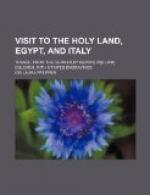[Illustration 8. Isthmus of Suez. ill8.jpg]
After an hour’s rest beside the well, we were still unable to procure water for our poor beasts, and hastened, therefore, to reach the town. At nine in the morning we were already within its walls. Of the town and its environs I can say nothing, excepting that they both present a very melancholy appearance, as there is nowhere a garden or a cluster of trees to be seen.
I paid my respects to the consul, and introduced myself to him as an Austrian subject. He was kind enough to assign me a room in his own house, and would on no account permit me to take up my quarters in an inn. It was a pity that I could only converse with this gentleman by means of a dragoman; he was a Greek by birth, and only knew the Arabic language and his own. He is the richest merchant in Suez (his wealth is estimated at 150,000 collonati), and only discharges the functions of French and Austrian consul as an honorary duty.
In the little town itself there is nothing remarkable to be seen. On the sea-coast they shewed me the place where Moses led the children of Israel through the Red Sea. The sinking of the tide at its ebb is here so remarkable that whole islands are left bare, and large caravans are able to march through the sea, as the water only reaches to the girths of the camels, and the Arabs and Bedouins even walk through. As it happened to be ebb-tide when I arrived, I rode through also, for the glory of the thing. On these shores I found several pretty shells; but the real treasures of this kind are fished out of the deep at Ton, a few days’ journey higher up. I saw whole cargoes of mother-of-pearl shells carried away.
I remained at Suez until four in the afternoon, and recruited my energies perfectly with an excellent dinner, at which tolerably good water was not wanting. The consul kindly gave me a bottle, as provision for my journey. He has it fetched from a distance of twelve miles, as all the water that can be procured in the neighbourhood tastes brackish and salt. In the inn a bottle of water costs two piastres.
The first night of my homeward journey was passed partly in a Bedouin encampment and partly on the road, in the company of different caravans. I found the Bedouins to be very good, obliging people, among whom I might wander as I pleased, without being exposed to injury. On the contrary, while I was in their encampment they brought me a straw-mat and a chest, in order that I might have a comfortable seat.
The homeward journey was just as monotonous and wearisome as that to Suez, with the additional fact that I had a quarrel with my people the day before its termination. Feeling exceedingly fatigued by a lengthened ride, I ordered my servant to stop the camels, as I wished to sleep for a few hours. The rascals refused to obey, alleging that the road was not safe, and that we should endeavour to overtake a caravan.




